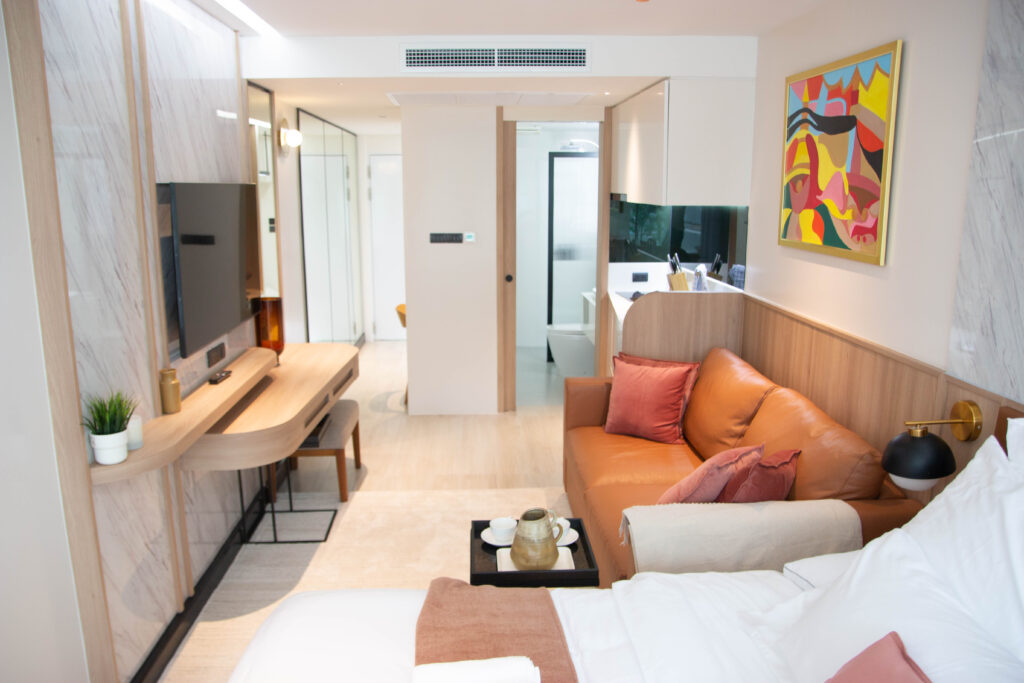In the world of real estate investment, hotel room investments stand out as a compelling option for savvy investors seeking both financial returns and a hands-off approach to property management.
In this article, we delve into the intricacies of hotel room investment, shedding light on the benefits, risks, and key considerations that can guide your decision-making process.
Article Outline
Understanding Hotel Room Investments
Hotel room investments involve acquiring individual rooms within a larger hotel property. The investment model typically grants investors a share of the revenue generated by the room, either through profit-sharing or fixed rental income. This unique approach offers a passive income stream, allowing investors to benefit from the lucrative hospitality sector without the day-to-day responsibilities of managing a property.
Benefits of Hotel Room Investments
One of the primary advantages of hotel room investments is the potential for passive income. Investors can enjoy a steady stream of revenue without the need for active involvement in property management. Professional management companies oversee the day-to-day operations of the hotel, ensuring a hassle-free experience for investors.
Furthermore, the hands-off nature of these investments provides a valuable solution for individuals seeking exposure to the hotel industry without the complexities associated with traditional real estate ownership. Hotel room investments offer a level of convenience and simplicity that resonates with those who prefer a more laid-back approach to their investment portfolio.
Navigating Risks in Hotel Room Investments
While the benefits are enticing, it’s essential to acknowledge and address the inherent risks associated with hotel room investments. These investments are closely tied to the overall performance of the hospitality industry and can be sensitive to economic downturns. Investors must carefully consider market conditions and economic indicators to make informed decisions.
Thorough due diligence is paramount when assessing potential risks. This includes evaluating the reputation of the hotel operator, researching market trends, and understanding the legal and contractual frameworks governing hotel room ownership. By taking a meticulous approach, investors can mitigate potential pitfalls and make strategic decisions that align with their financial goals.
How To Invest In Hotel Rooms
Step 1: Define Your Investment Goals
Begin by clearly defining your investment objectives. Are you seeking regular income, capital appreciation, or a combination of both? Understanding your goals will help shape your investment strategy.
Step 2: Market Research for Hotel Room Investment
Conduct thorough market research to pinpoint locations with robust tourism or business potential. Assess local market trends and competition to identify opportunities for hotel room investment.
Step 3: Financial Assessment
Evaluate your financial capacity and risk tolerance. Consider the size of the investment, potential financing options, and expected returns from hotel room investment. Analyze the historical financial performance of the hotel to make informed decisions.
Step 4: Legal Due Diligence
Engage legal professionals to navigate the legal landscape. Review zoning regulations, land-use restrictions, and contracts related to hotel room investment. Ensure compliance with local laws to mitigate risks.
Step 5: Operational Due Diligence for Hotel Room Investment
Assess the operational efficiency of the hotel, specifically focusing on the management of individual rooms. Consider factors such as staffing, guest satisfaction, and the condition of the rooms.
Step 6: Choose Your Hotel Room Investment Type
Determine whether you prefer full ownership, partial ownership through investment vehicles, or the unique approach of hotel room investment. Each option has its advantages, and selecting the right type aligns with your investment goals.
Step 7: Hotel Room Investment Management
Decide on your level of involvement in hotel room management. Whether you opt for hands-on management or enlist a professional management company, choose an approach that suits your preferences and aligns with your goals.
Step 8: Financing Options
Explore financing options for hotel room investment, including bank loans, private equity, or partnerships. Consider the terms, interest rates, and loan-to-value ratios to make informed financing decisions.
Step 9: Hotel Room Investment Risk Management
Develop a robust risk management strategy. Consider economic conditions, market dynamics, and potential disruptions in the hospitality sector. Diversify your portfolio to mitigate risks associated with hotel room investment.
Step 10: Plan Your Exit Strategy
Anticipate the need for an exit strategy. Define conditions for divestment or sale based on your investment goals. Stay informed about market trends to time your exit strategically.
Frequently Asked Questions (FAQs) About Hotel Room Investments
Curious about hotel room investments? You’re not alone! Here, we’ve compiled some common questions about this exciting investment opportunity, along with answers to help you dive deeper into the world of hotel room investments.
1. What exactly is a hotel room investment?
– Think of it like this: you’re not buying the whole hotel, just individual rooms within it. With a hotel room investment, you become a partial owner of these rooms, earning a slice of the revenue they generate. It’s a fantastic way to dip your toes into the hospitality industry without taking on the full responsibility of owning an entire property.
2. How do hotel room investments make money?
– Ah, the golden question! Hotel room investments generate income in various ways, such as room bookings, dining, and other services offered by the hotel. As an investor, you get a piece of the pie – whether it’s through profit-sharing or a fixed rental income.
3. Why should I consider investing in hotel rooms?
– Picture this: passive income, exposure to the bustling hospitality sector, and diversification for your investment portfolio. Hotel room investments offer all these perks and more. Plus, who wouldn’t want to be part of an industry that’s all about making people feel welcome and pampered?
4. But aren’t there risks involved?
– Of course, every investment comes with its own set of risks. Economic downturns, market fluctuations, and operational challenges are just a few to keep in mind. However, with careful research, smart decision-making, and perhaps a sprinkle of good luck, these risks can be managed effectively.
5. How do I know which hotel room investment is right for me?
– Ah, the million-dollar question! Location, reputation of the hotel operator, and financial performance are all key factors to consider. Whether you’re eyeing a bustling city center or a serene resort destination, there’s sure to be a hotel room investment that aligns perfectly with your investment goals.
6. Can I finance my hotel room investment?
– Absolutely! Financing options like bank loans, private equity, and partnerships are available to help you make your hotel room investment dreams a reality. Just be sure to crunch the numbers and choose the option that best suits your financial situation.
7. What’s the plan if I want to cash out?
– Ah, the exit strategy! Whether you’re looking to sell your investment, divest from the property, or simply cash in your chips, it’s essential to have a plan in place. By staying informed about market trends and keeping your options open, you’ll be ready to make a smooth exit when the time comes.
8. Is hotel room investment suitable for everyone?
– While hotel room investments can be an excellent opportunity for many investors, they’re not necessarily the right fit for everyone. It’s essential to do your homework, assess your risk tolerance, and consult with experts like RealEstateMoses before diving in. With the right approach, hotel room investments can be a rewarding addition to your investment portfolio.
Our Conclusion On Hotel Room Investments
When it comes to real estate investment, hotel room investments provide a unique avenue for investors to diversify their portfolios. Hotel room investments offer a passive income stream, making them an attractive option for those seeking financial returns without the hands-on responsibilities of property management.
When considering hotel room investments, it’s crucial to conduct thorough due diligence. Assessing market conditions, understanding legal frameworks, and scrutinizing contractual agreements are vital steps in making informed investment decisions.
Investing in hotel rooms aligns with the growing trend of seeking alternative sources of income in the real estate sector. The hands-off nature of these investments, coupled with the potential for passive income, positions hotel room investments as a lucrative option for investors looking to capitalize on the hospitality industry’s success. As you explore investment opportunities, keep in mind the potential rewards and risks associated with hotel room investments, ensuring your portfolio aligns with your financial objectives.
Access Lucrative Hotel Room Investment Opportunities
Are you seeking promising opportunities in fractional real estate investments? RealEstateMoses opens doors to exclusive projects tailored for hotel room investments, promising impressive returns on investment.
Our projects span across Africa, North America, Asia, and Europe, presenting you with the chance for fractional ownership in upscale hotel properties. Not only do you gain a stake in these prestigious locations, but you also benefit from comprehensive property maintenance, administration, and marketing services.
For further insights into these enticing hotel room investment opportunities, simply click here to connect with RealEstateMoses. Step into a world where luxury living knows no bounds, and your investment potential reaches new heights. Oh Yeah!!!
Moses Oyong is a luxury real estate advisor with a passion for arts and culture, music, fashion, and all things luxurious. With a keen eye for beauty and attention to detail. I strive to help my clients find their dream homes that reflect their unique sense of style and taste whilst providing them with the right information to ease the stress of the decision-making process.




